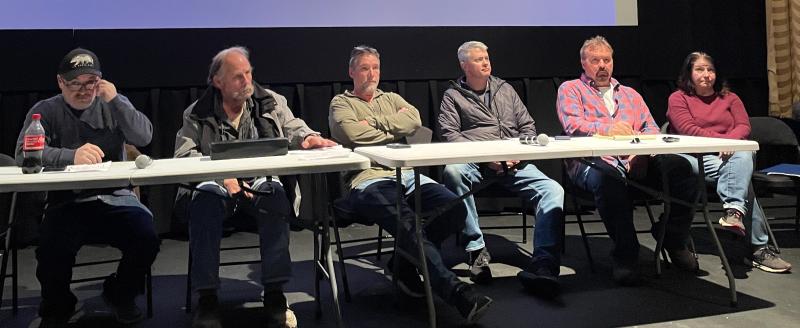CSD referendum hearing draws public interest, questions
After voters rejected a costly middle-elementary school renovation project in November, the Community School District (CSD) will hold a referendum for a second one April 24. On April 10, the CSD held two back-to-back public hearings hosted by a panel of school administrators, project architects and members of the school board and board of trustees.
During the two sessions combined, over 100 residents packed Harbor Theater and could ask questions on the $29,975,000 million project. The panel explained some of its details, its tax impact and the school conditions that led them to propose it.
School board chair Peggy Splaine said the problems are not new and have been brought up for years. “And every time they're brought up and a vote goes, people say, ‘Oh, just do what you have to. Just band-aid it. We don't want to put the money out now,’" she said.
But Splaine said there is never a good time to ask taxpayers to fund such a large project, especially when many don’t have children in schools or are living on a fixed income. “We understand and we understand it's a big ask. So, just because we're sitting up here doesn't mean to say that we don't understand all your questions and your thoughts.”
A video tour of Boothbay Region Elementary School led by Principal Shawna Kurr and trustee chair Steve Lorrain showed aging plumbing, a leaky roof and other failing systems Lorrain said are at the expected end of their life cycles, about 30-40 years. Kurr highlighted cluttered classrooms, windowless basement education spaces and learning areas in hallways. The video included an interview with two former students who said the school was not horrible, but outdated, rudimentary and made them feel like they were living in the past.
According to the district, when the building was constructed, schools were not required to provide the same services as today. These include therapists, social workers and special educators, part of “intervention” education. As state standards changed, more space had to be dedicated for interventions, crowding already used areas. “We literally use every nook and cranny to work with students,” Kurr said.
Superintendent Robert Kahler presented projections for the maximum tax impact of the $30 million bond at 4% interest, if enacted all at once. He said the mil rate would increase by $1.20 in Boothbay and $0.98 in Boothbay Harbor per $1,000 of assessed home value; a taxpayer with a $300,000 home could be annually responsible for an extra $360 in Boothbay and $294 in Boothbay Harbor. However, Kahler said the school plans to bond the money in three stages, 2026, 2027 and 2028, and the tax burden would decrease after 2029.
According to the district, the project would be completed in six five-month phases, and bond costs would end in 2053. The timeline raised a question from Boothbay resident Desiree Scorcia, who asked the life expectancy of renovations. According to project architect Lance Whitehead, it would be about the same as the original structure. “We expect that 40 years from now our kids will be standing up having the same debate,” he said.
Between the two hearings, panelists answered almost an hour’s worth of questions. They told Boothbay Harbor resident Steve Carbone the district will seek state funding, but chances of receiving it are slim. Boothbay resident, and self-described hopeful future parent, Riley Mitchell asked why conversations on regionalization weren’t taking place. Splaine said the district has talked with other towns. “So far, their level of interest has not been in favor of giving up school choice to join us to have a higher tax burden on their taxpayers,” she said.
Jim Farrin, from Boothbay Harbor, asked how the plan differs from the failed $28.8 million referendum in November. Panelists said some items were removed and other more cost-efficient ones were added. Trustee Troy Lewis said inflation is a large reason for the high cost. “We’ve lost a lot of that savings that we took out by moving things around and making things smaller,” he said.
Boothbay resident Patty Minerich disagreed. She said many peninsula residents live paycheck to paycheck or on a fixed income, and Maine property owners already pay a high tax rate. “The waterfront homes owned by seasonal residents from away do not reflect the real demographics of our year-round community and the daily struggle of these citizens to make ends meet,” she said.
She said many of these financially vulnerable residents turned out to express their choice in November. She said the new referendum is a repeat that ignores voters’ will and could violate the school charter and state statutes. “Is this a legal, legitimate referendum? Have you reviewed that statute with an attorney? And what did they say?”
“They said yes,” Splaine responded. “And they said the voters have the right to make decisions."
Minerich later told the Register she was not assured and may seek legal counsel on the issue.































